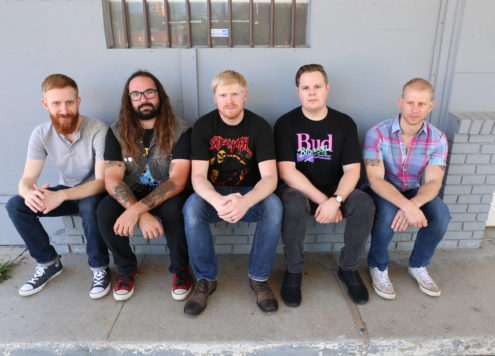Remaining creative after 30, and the lessons I learned from Bud Bronson & the Good Timers
The funny thing about having an identity crisis as an artist is that you never really understand it’s happening until it’s over, because an identity crisis feels like inspiration, and inspiration feels like an identity crisis.
In the autumn of 2017, I found myself in the middle of such a state. That spring, I had quit my main gig as guitarist with a group (Two Cow Garage) that I had at one time considered “my favorite band,” and was struggling with having to find out who my identity was if I wasn’t “Todd from Two Cow.” I didn’t want to be a sideman anymore, and I felt like I had my own voice that couldn’t be loud enough while playing someone else’s music.
I spent the rest of the year turning 30 and touring with my own band, Benchmarks, with whom we had just released a record called Our Undivided Attention towards the beginning of that year. The band was unable to tour that fall, so I looked for other work. I received a phone call from Sammy Kay, who was looking or a lead guitarist for a North American Tour supporting the Creepshow, and I was right back into playing someone else’s music.
On this tour, two very important and life-changing things happened to me: First, while sitting on a bench outside a coffee shop in Columbus, Ohio, three days into a 31 day tour, my wife told me that we were pregnant. Second, Brian Beer from Bud Bronson & the Good Timers sent me the master to their new and unreleased album Between the Outfield and Outer Space.
My previous ideas of what a musician is or isn’t supposed to be were already in question, but now were on trial. I knew I would have to scale back touring, and I knew I would have to make some decisions that would affect my creative output in the future. These are the selfish thoughts that every father-to-be has in one way or another.
However, there was good news. Bud Bronson & the Good Timers (BBGT) had a new record, and that record existed as one long continuous .wav file in my inbox.
“Can you even consider it a right of passage if you never really let it pass?”
-“We Are the Champions (of the Basement)”
To truly understand the gravity of Between the Outfield and Outer Space, you must understand their previous record, Fantasy Machine. I adored Fantasy Machine, enough to the point where I was quoted on their Bandcamp page saying something to the effect of “this is the greatest record of all time.” Anthems of a waning youth in the form of clutching to teenage nostalgia and twin guitar leads struck a chord in my 28-year-old mind and heart. It’s a record that is simply about being 28. The party isn’t over, but you know the sun is coming up soon.
However, that party will end. The sun will come up. On Between the Outfield and Outer Space, there is a pale pink light on the eastern horizon…time is running out.
The album starts with “We Are the Champions (of the Basement)”, and is true to the BBGT we know from the previous album. With a killer riff and shout-along chorus, it harkens back to the need for hanging on to the “glory days” so often talked about, but also the anxiety of leaving them behind. It isn’t until the next track “Life of Purpose”, that singer Brian Beer begins to detail his own identity crisis as he sings, “I wanna know what I’m made of, we made a mistake. Will I stand up and fight, or just sit and wait?” As he states his intention “I’m gonna live a life of purpose”, he makes a declaration as to where the rest of the record is going to go. We are about to take a ride from that twilight period between summer and autumn, that feeling of fearful transformation dominates the rest of the album.
“It used to be about debauchery/clinging to teenage fantasy/but now it’s an exit strategy/a way to escape reality.”
-“Back to the Womb”
The next few tracks detail the growing isolating feeling that comes with age. We’re losing touch with the things we once considered to be the most important things in existence. Our identity as touring bands has forever been tied to the idea that this is fun, and the party never ends. Eventually, there’s a dramatic shift where the purpose goes from “this is fun, this is the best” to “I have to do this in order to remain sane.” In a world that is so rapidly diminishing the value on art, and the value on the truth, how do we keep ourselves from succumbing to that eternal and endless abyss of routine? We keep creating, even though we know that our creation will never be valued the way it should. Because it’s not about everyone, it’s about us. It’s not being validated for what you have to say, it’s about speaking.
It’s also important to note that while the subject matter of this record is heavier and darker than the previous, the music still marches with reckless abandon. Perhaps it’s fittings, as we discuss holding onto summer of our lives, we also cling to rock and roll. The Thin Lizzy-esque guitar passages and full on “fist in the air, heart on the sleeve” approach to the music gives us hope that while we may grow up, we don’t grow old. The world is changing, but rock and roll isn’t dead, and neither are we.
“We can turn the amps up to 11, but it probably won’t accomplish much except pissing the neighbors off.”
-“Good Guys Fight On”
Again, we revisit Fantasy Machine (and our own, vigorous youth) here. These things we’ve loved our entire lives may not, in fact, change the world like we believed they would when we were in our basements at age 16. They still might, but that isn’t the goal anymore. The goal is to exist, in whatever way we can. It may be to exist in your music scene, in the world music conversation, or maybe just to yourself. Art is not a sport. You don’t succeed by being the best because there is no such thing.
Rewind to that cold November tour I found myself on in 2017. My place in the back left seat of the van was dominated by this long .wav file with no song titles or timestamps, from New Jersey to Reno, Vancouver to Winnipeg, and we were headed back to the States and my home of Nashville. This was my last stop, and lucky for me, I had booked BBGT to play the show with us as they continued their tour north. The final song is the soundtrack of me walking through the door and hugging my wife for the first time in a month, without being able to say anything because we were surrounded by two bands who were crashing at our house that night (note: my wife is a saint).
That night, BGBT played a good portion of that record that almost nobody had heard except for me, and it was nothing short of inspiring. I spent the winter finishing writing the Benchmarks record (due for release in 2019), and re-imagining what my role in the world is as a creator, and as a human being. I realized that my value as an artist does not rely on how many records I sold, or what my draw was at the show, but that I was creating at all. Whether I’m playing 30 or 300 dates a year doesn’t matter as long as whatever it is I have to say is being said.
I hope that Brian makes it through his identity crisis as I did. At the very least, I hope that the band understands that their art has incredible value. It may not make them rich, and they may not be able to survive as a full-time rock and roll band (but I hope they do). More importantly, I want them to know that they helped me survive my own identity crisis. I want them to know they’ve created one of my favorite records of all time.
Between the Outfield and Outerspace sees release on October 12. Words by Todd Farrell Jr.








Social Media